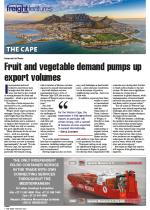International and local lockdown restrictions have brought their fair share of woes, but they’ve also resulted in soaring demand for fruit and vegetables – which is good news for local exporters.The value of wine exports also increased by 7.7%, amounting to R9.1 billion in 2020.Wesgro senior export promotion manager: Europe, Erica Joubert, told Freight News that Western Cape exporters had embraced online platforms and e-commerce to support their businesses – a trend that is likely not only to continue, but grow significantly in 2021.“Many businesses in the services sector – such as e-learning, training, augmented and virtual reality – have also indicated that their services are now in demand internationally,” she said. “For the Western Cape, the expectation is that agricultural exports in particular will remain strong, with a number of business services expected to expand internationally – and with business services representing close to 80% of Western Cape GDP, this is a key element of Wesgro’s export strategy for the next five years.”But, said Joubert, there was no denying the challenges of 2020 – especially relating to cash f low and payment of employees for many exporters whose products were in lower demand.“As a result, many businesses have had to implement cost-cutting measures, including reduced staff salaries, compulsory staff holidays and retrenchments.”Moving cargo has also not been easy, and challenges at land border posts – given the latest restrictions on the movement of goods to neighbouring countries – had to be dealt with. In addition, exporters have been unable to travel to international markets (either with the Department of Trade, Industry and Competition or Wesgro, or directly) to meet new clients, build new relationships or expand current relationships. Buyers are also still unable to come here and see local operations first hand. “Exporters relying on air cargo are significantly impacted, given the decrease in f lights in general, but this has been compounded with countries now closing their borders to South Africa thanks to the new variant. We have seen a significant decrease in revenue due to contraction in global demand, while implementation of internal health protocols has meant increased costs and fewer staff to process orders.” This all comes as Western Cape exporters were already experiencing challenges given their reliance on Chinese imports, largely relating to shortages of raw material. “While this remains a challenge, the upside is that some exporters have realised that certain inputs can be sourced locally instead.”The wine industry also remained under severe pressure, she said. “Given that harvest time is here, wine producers are struggling to make space for the next harvest to process wine, which will impact 2021 and 2022 exports.”But hopes are high that exports will improve if the global economy improves.

